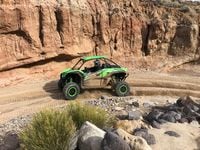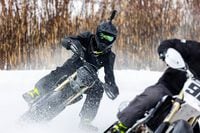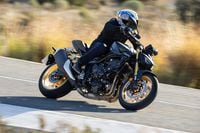I had never been on a Kawasaki UTV and I had never explored the Red Rock Canyon area east of California’s Highway 14. So when the company invited me to take a spin, I said yes and headed north.
The result: five glorious hours of creeping, crawling, and crazy high speeds over terrain that included deep sand washes, dirt roads, rocky stream beds, dry river beds, and steep hill climbs.
Kawasaki’s Teryx KRX 1000 is all-new for 2020. The Japanese powersports giant has given this green machine a new engine, new transmission, new frame, and new suspension in an attempt to compete in an arena currently dominated by Polaris and Can-Am—and crowded with UTVs from Honda and Yamaha too.
The company’s Senior Coordinator for Public Relations Jon Rall and Next Level Sports Management account director Tom McGovern, who’d invited me out, had also recruited independent desert guide Cain Smead, and put him in charge of the day’s route. With Smead in the lead and me trying to keep up, we left Ricardo Campground and headed for the El Paso Mountains, which run just northeast of the Mojave Valley’s well-known Jawbone Canyon off-road riding mecca.
The 2020 KRX1000 is powered by a 999cc, liquid-cooled, four-stroke parallel twin engine that makes a claimed 76 pound-feet of torque. Delivered through a CVT transmission with centrifugal clutch and on-the-fly switchable two-wheel drive/four-wheel drive options, it’s quick, fast, and responsive.
Steering on this UTV is electronic and speed-sensitive. As we gathered pace up the first sand wash, shooting up to 50 mph, the KRX felt effortless and absolutely indifferent to minor disturbances in the terrain. Rock? Bush? Whoops? Didn’t even notice them.
Soon we were out of the sand and into rockier terrain. The KRX, even at higher speeds, remained unperturbed. Steep and sudden drops into streambeds put the machine’s 14.4-inch ground clearance to work. With 19 inches of travel in the front and 21 inches in the rear, and the 15-inch aluminum wheels wearing 31-inch Maxxis Carnivore rubber, the route presented nothing to raise the Teryx’ temperature.
Then came the complicated stuff. The first challenge was an off-camber rock face with a wide trail that narrowed sharply just over the rim—out of sight. Smead went first, to show us the line, and then stood at the top to make sure we followed it. (Otherwise, we’d have found out how much protection we’d get from the sturdy frame and the three-point harness in a rollover.)
That narrow trail then narrowed further, between some medicine ball-sized boulders, until it was too narrow to pass without rock rolling. I put one wheel on one rock and one wheel on another, and rolled over nicely.
At no point on the drive was I aware of the transmission, which means the centrifugal CVT system was really doing its job. The Teryx moved effortlessly from boulder bouncing to flat-out sand screaming.
I wasn’t aware of the braking, either, except to appreciate how responsive it felt. The stainless steel rotors, with twin-piston calipers in front and single ones in back, were more than adequate.
I was also really comfortable, which hasn’t always been my experience in UTVs. The Teryx was fitted with high-back bucket seats with roughly 6 inches of front-to-back adjustment. My very tall driving partner for the day, at 6-foot-3, said he felt right at home when he took his turn behind the wheel.
Further comfort was theoretically available. The KRX 1000 line has more than 50 genuine Kawasaki accessories available, including roofs, windshields, audio systems, six-point harnesses, heather kit, winch kits, and more. The “I Want It All” package, which includes a wide array of these options, adds about $9,000 to the $20,499 base sticker price.
The next rock face carried an additional challenge. Half of it wasn’t rock, but was instead composed of loose rock, sand, scree, and debris. Still, the KRX 1000 climbed tidily, pausing only briefly midway up to spin a little sand off one back tire.
At the top, looking back down, I was glad we weren’t coming back that way, since I didn’t like the idea of being inside the 1,900-pound vehicle if and when it decided to start sliding downhill. I happily settled in for a half-hour of fast sand washes, dirt roads, and deep whoops. Thank you, coilover springs and Fox shocks.
Then the road climbed and dumped us into the little bowl that forms the parking lot for Burro Schmidt’s Tunnel.
On a springtime weekend this spot—the northern adit for a half-mile-long tunnel built by hand, over a 38-year period, by William Henry “Burro” Schmidt—looks like a Super Bowl Sunday tailgate party, but this day we had it entirely to ourselves.
Rall and McGovern had employed their Teryx’s storage compartments intelligently. Before you could say, “Pardon me, would you have any Grey Poupon,” luncheon was served. Somehow, they’d even kept the sodas cool. Assuming the most challenging bits were behind us, I toasted my hosts and thanked them for a good day of desert fun.
It turned out I’d celebrated too soon. After some more sightseeing around the El Pasos, our trail found us back at the top of the rock face I’d been eager to avoid descending. The Kawasaki fellows told me to put the Teryx into Crawl mode, take a relaxed hold on the wheel, and leave the braking to the vehicle. I peaked over the edge, swallowed hard, and did as I was told. The able UTV walked itself down the hill without a hiccup.
That left one to go. We picked our way back across the medicine balls, pointed in the direction of the trail we climbed earlier, and got off the rock face without incident. I was reminded, once again, as I am reminded so often in the powersports world, that the machines I’m allowed to drive and ride are always up to more challenging shenanigans than I am capable of performing. My trip in the Teryx may have had me nervous a few times, but the machine itself wasn’t even breathing hard.
The day’s route was scheduled for under 100 miles, so range wasn’t an issue. We got back to Ricardo with plenty of gas in the 10.6-gallon tank. Thanks to all that suspension and the fat rubber, I wasn’t even worn out.
I wanted more. Good sign.






















/cloudfront-us-east-1.images.arcpublishing.com/octane/B6XD6LS6IVCQPIU6HXDJSM3FHY.jpg)
/cloudfront-us-east-1.images.arcpublishing.com/octane/ICL63FEDDRDTTMINYICCEYGMDA.jpg)
/cloudfront-us-east-1.images.arcpublishing.com/octane/FCGZHQXRBZFLBAPC5SDIQLVF4I.jpg)
/cloudfront-us-east-1.images.arcpublishing.com/octane/WNOB6LDOIFFHJKPSVIWDYUGOPM.jpg)

/cloudfront-us-east-1.images.arcpublishing.com/octane/X33NU3E525ECRHXLNUJN2FTRKI.jpg)
/cloudfront-us-east-1.images.arcpublishing.com/octane/6KKT5NNL2JAVBOXMZYS5ZO76YA.jpg)
/cloudfront-us-east-1.images.arcpublishing.com/octane/J5RKG5O455GMPGQRF2OG6LRT7A.jpg)
/cloudfront-us-east-1.images.arcpublishing.com/octane/GX2CIZKQVRH2TATDM26KFG2DAE.jpg)
/cloudfront-us-east-1.images.arcpublishing.com/octane/ZWIDYSAKQZHD5BHREMQILXJCGM.jpg)
/cloudfront-us-east-1.images.arcpublishing.com/octane/CYUHJZCTSJCH3MRAQEIKXK7SCQ.jpg)
/cloudfront-us-east-1.images.arcpublishing.com/octane/LKOFINY56FCXJCANJ5M7ZDQUBY.jpg)
/cloudfront-us-east-1.images.arcpublishing.com/octane/4NBPDACMWJH63JQYJVK3QRBDZI.jpg)
/cloudfront-us-east-1.images.arcpublishing.com/octane/KKHQHRR3FJGX7H2IPU6RALMWG4.jpg)

/cloudfront-us-east-1.images.arcpublishing.com/octane/5IOFS5JAE5FOXMNA23ZRAVVYUU.jpg)
/cloudfront-us-east-1.images.arcpublishing.com/octane/CGXQ3O2VVJF7PGTYR3QICTLDLM.jpg)

/cloudfront-us-east-1.images.arcpublishing.com/octane/OQVCJOABCFC5NBEF2KIGRCV3XA.jpg)
/cloudfront-us-east-1.images.arcpublishing.com/octane/OPVQ7R4EFNCLRDPSQT4FBZCS2A.jpg)
/cloudfront-us-east-1.images.arcpublishing.com/octane/YBPFZBTAS5FJJBKOWC57QGEFDM.jpg)
/cloudfront-us-east-1.images.arcpublishing.com/octane/W5DVCJVUQVHZTN2DNYLI2UYW5U.jpg)
/cloudfront-us-east-1.images.arcpublishing.com/octane/C3VIRIAYNZCTJAZNRLREDS3JCM.jpg)
/cloudfront-us-east-1.images.arcpublishing.com/octane/XXWKUKITWRAF3HCJAWGJ25V7BA.jpg)